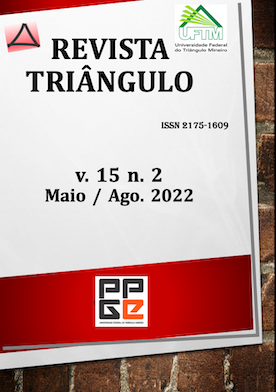A importância do pensamento socrático para o ensino de filosofia na Educação Básica
DOI:
https://doi.org/10.18554/rt.v15i2.6242Palavras-chave:
Educação. Filosofia. Ironia. Maiêutica.Resumo
O presente estudo tem por objetivo apresentar a importância do pensamento socrático para o ensino de filosofia na educação básica, considerando a relevância, a observância e a prevalência do método socrático na contribuição para o avanço de novas metodologias na educação alcançando uma formação humanitária e libertadora do ensino e do ser humano. Focaremos na característica da filosofia socrática de condicionar seus discípulos a uma reflexão sobre suas próprias afirmações e conclusões, mostrando a carência e a superficialidade do que é conhecido, estimulado uma autorreflexão na busca de autonomia e conhecimento, por meio da ironia e da maiêutica, associada a valorização da crítica e do pensamento autônomo do aluno em busca da virtude e do bem viver. As considerações convergem na percepção de como o pensamento socrático renova os ensinamentos para nossa realidade, orientando para a erudição, o exercício da cidadania e a construção de um conhecimento crítico e social.
Referências
ARANHA, Maria Lúcia de Arruda; MARTINS, Maria Helena Pires. Filosofando: Introdução à Filosofia. São Paulo: Moderna, 1996.
CERLETTI, Alejandro. O ensino de Filosofia como problema filosófico. Belo Horizonte: Autêntica, 2009.
CHAUÍ, Marilena. Filosofia: Ensino Médio. Volume único. São Paulo: Ática, 2005
KIERKEGAARD, Soren. O conceito de ironia constantemente referido a Sócrates. 2. ed. Tradução de Álvaro Valls. Bragança Paulista: EDUSF, 2005.
NUSSBAUM, Marta. Cultivating Humanity. Harvard University Press, 1997.
PLATÃO. Ditos e feitos memoráveis de Sócrates. (Coleção os Pensadores). São Paulo: Editora nova cultura, 1996.
PLATÃO. Diálogos: Teeteto e Crátilo. Tradução de Carlos Alberto Nunes. 3. ed. Pará: Editora universitária UFPA, 2001.
REALE, Giovanni; ANTISERI, Dario. História da filosofia: Filosofia Pagã Antiga. 3.ed. São Paulo: Paulus, 2003.
RORTY, Richard. Contingência, ironia e solidariedade. São Paulo: Martins, 2007.
Downloads
Publicado
Edição
Seção
Licença
Copyright (c) 2022 Revista Triângulo

Este trabalho está licenciado sob uma licença Creative Commons Attribution-NoDerivatives 4.0 International License.
Autores que publicam nesta revista concordam com os seguintes termos: Autores mantém os direitos autorais e concedem à revista o direito de primeira publicação, com o trabalho simultaneamente licenciado sob a Licença Creative Commons Attribution que permite o compartilhamento do trabalho com reconhecimento da autoria e publicação inicial nesta revista.




